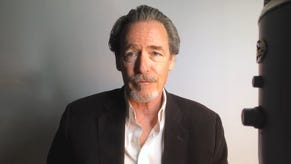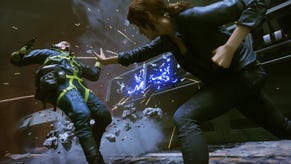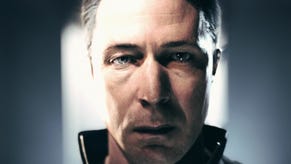Control is Remedy's most exciting project in years
Wake up.
I'm calling it, I'm finally letting go of Alan Wake. There is more to Remedy than its hoodie-and-tweed-wearing writer hero, and more to the studio's trademark brand of pulpy sci-fi than his gravelly, never-ending voice-overs. This is a good thing. Six years on from Wake's last outing, with no sequel in sight and Remedy's odd, live-action hybrid Quantum Break out of the way, Control feels like a clean break for Remedy.
Control is the studio's first game for PlayStation 4 - its first for any Sony platform since Max Payne 2 on PS2 - something underlined by its unveiling at Sony's E3 conference. ("It felt like a good way to announce it this way and make this statement," Sam Lake, Remedy's chief writer and public face of the studio tells me after.) Control is also a clean slate to tell a new story with a more modern approach - albeit one which will still feel familiar to the studio's fans.
The demo shown to press at E3 2018 is a proper peek at what everybody saw during the game's Sony conference trailer. You play as Jesse Faden (Courtney Hope, AKA Beth in Quantum Break), who like all Remedy protagonists is skilled in third-person shooting and physics manipulation while exploring dark, mysterious surroundings. These surroundings will host a big change for Control - a space to explore with a narrative path, but also side-missions and Metroidvania-inspired exploration. At one point in the demo we pass a series of prison cells, the unlucky occupant of one screaming for help. It's a side-mission which we can return to later.
"There's a hub, but it's big sprawling location," Lake says. "From the outside, the Department of Control is a big, brutalist building in Manhattan. Inside, it's vastly bigger, operating on dream logic and magic, ritualistic rules. If you know the right steps, the building shifts and you have access to areas you didn't before. You might have gone through an area multiple times before you gain the power of levitation which can then lead you elsewhere again. [Metroidvania] was certainly an inspiration."
The Department of Control is a space specifically designed for the type of storytelling Remedy wants to employ - one not constrained by cut-scenes, lost pages of a book or live-action TV episodes, but which unfurls itself more naturally as you venture deeper into its world. As someone who enjoyed visiting the worlds Remedy created in the past but left them frustrated by the limitations of their narrative devices, it's promising news. ("I'm proud of what we achieved - live-action was an experiment," Lake says when I ask if Remedy had any plans to dabble in live-action again. "I don't think we'll do that again, exactly the same way. Coming out of that - it was a long project and a lot of work - in Control we're trying quite a few new things.")
What begins as a mundane US government office building quickly turns into a creepy TARDIS-like expanse, a house of horrors. Dead agents hang motionless in mid-air, offed by Control's mysterious reality-bending force, the Hiss. Others, still alive, possessed, drop to the floor and open fire as Jesse conjurs up some quick cover using nearby items. Tables, chairs, and nearby debris act as part of a force field which can then be flung back into the enemies' faces, alongside their own bullets. Jesse also has the coolest-looking sci-fi gun in any game at E3 - a hand cannon made up of Rubik's cube-esque blocks which fling themselves into various formations as you switch between different firing modes. The coast again clear, the action shifts again back to a mundane building, and a moment of calm.
"It's a very mysterious, deep world and lore," Lake continues. "And the main story has a slightly different purpose now - to introduce this world to our main character and the player. And, in a different way to how we've done before, there are other stories in this world, other missions to go on. It's less linear, more player-driven."
I'm all for more story and more mystery to solve, and somewhere with a bit more to explore than the straightforward if beautiful environments and set-pieces in Remedy games of the past. Expect a couple of nods to those games, too - ("I can't confirm, but yes...", Lake confirms when I ask about Alan Wake references). Due out in 2019, Control still has plenty of time to get its right, and flesh out the first steps seen here.






.jpg?width=291&height=164&fit=crop&quality=80&format=jpg&auto=webp)











